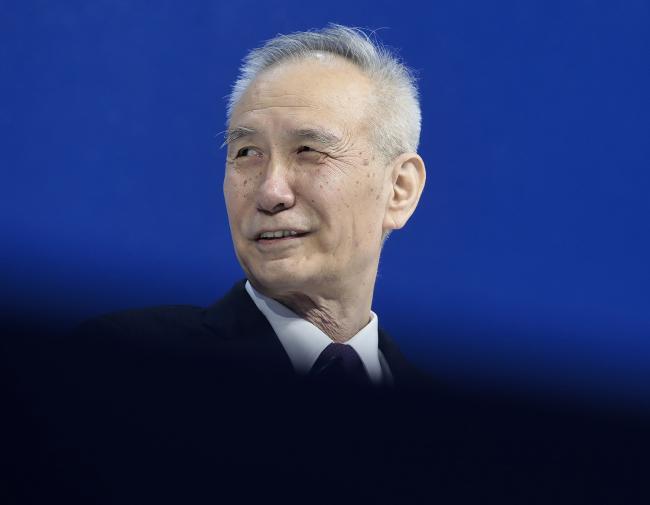(Bloomberg) -- The U.S. and China are sitting down Wednesday for the first of two days of high-level talks aimed at finding a solution to a trade war that’s casting a growing shadow on both of the world’s two largest economies. But don’t hold your breath for a deal.
Treasury Secretary Steven Mnuchin, who remains the most prominent advocate of a deal in the Trump administration, on Tuesday told the Fox Business Network he expected “significant progress” in this week’s talks.
Administration officials and other people familiar with the state of play, however, say the two sides remain far apart on key issues, with the U.S. side still engaged in an internal debate over how to proceed and ill-prepared for this week’s meetings. The U.S.’s unveiling this week of criminal charges against Chinese corporate giant Huawei Technologies Co. isn’t helping the mood.
The two days of talks between delegations led by Xi Jinping’s top economic emissary, Liu He, and President Donald Trump’s trade tsar, Robert Lighthizer, are the highest-level negotiations since the two leaders sat down for dinner Dec. 1. They come in the wake of lower-level talks this month in Beijing and after a period of market turmoil that has left both governments eager to publicly claim progress to calm investors’ nerves.
In a sign of the importance the White House is placing on the talks, Trump is expected to meet Liu while he’s in Washington. In addition to U.S. demands for structural reforms in China’s economic policy and key concessions on issues such as intellectual property, the latest round of talks will cover Beijing’s pledge to buy more American goods.
Lighthizer’s office didn’t immediately respond to an emailed request for comment on Tuesday. People familiar with the U.S.’s internal discussions, however, say Trump appears to want to strike a deal. The stakes remain high ahead of a March 1 deadline that, if talks fail, could see the U.S. raise tariffs on $200 billion in imports from China to 25 percent from 10 percent, a result neither side is keen to see happen.
But just how to craft a deal that’s politically acceptable in an increasingly hawkish Washington remains unclear, people familiar with the discussions said. Too many issues are on the table, leading to what some see as a potential gridlock in the talks.
U.S. officials have expressed frustration over an internal split between those like Mnuchin who favor making a deal with China and others who advocate a tougher approach, including Lighthizer, which combined with Trump’s unpredictability has created a chaotic policy-making process, according to people familiar with the deliberations.
Low Expectations
For experts, expectations remain low for any meaningful progress this week.
“At the end of the week we’ll probably get some fairly bland statements suggesting that talks made progress,’’ David Dollar, a former U.S. Treasury representative in China now at the Brookings Institution, told a conference on Tuesday. “I don’t think they can hammer it out in the next few days.’’
Senior U.S. officials are said to remain mindful of the limits of their ability to agree to something meaningful with Trump having rejected proposals brought to him in the past. The politics of any deal are also growing more complicated as Trump’s standing in the polls has been falling again after his gambit to shut down the government to force Congress to approve funding for a wall on the Mexican border went wrong.
“The only person who can cut a deal is Donald Trump. But it’s difficult for him to do so under the current circumstance because he is facing a lot of criticism domestically,’’ said Cheng Li, research director of the Brookings’ John L. Thornton China Center.
Economic Slowdown
Trump has made much of China’s economic slowdown, arguing that it increases pressure on Xi to strike a deal. But the U.S. economy and U.S. companies are also beginning to see damage from the trade war.
The non-partisan Congressional Budget Office on Monday said it expected that Trump’s tariffs on steel, aluminum, and Chinese goods would cut the U.S.’s real gross domestic product by at least 0.1 percent on average through 2029. It also predicted overall U.S. GDP growth would slow to 2.3 percent this year, 1.7 percent in 2020, and 1.6 percent in 2021.
Mnuchin on Tuesday acknowledged that growth has slowed in Europe and China, but said he didn’t expect that to dent U.S. growth that he insisted wasn’t being hit by the trade dispute with China. “There is still a very good case for 3 percent growth this year,” he said.
The business community remains more anxious about slowing growth in China and the prospect that the tariffs complicating life for many companies will remain in place for the foreseeable future.
Apple, Harley
Apple Inc (NASDAQ:AAPL). on Tuesday reported a steep drop in sales in Greater China, representing almost $5 billion of lost revenue. Harley-Davidson Inc (NYSE:HOG). earlier in the day said it barely broke even in the last quarter of 2018 after getting caught up in Trump’s trade wars. On Monday, Caterpillar Inc (NYSE:CAT). reported its biggest quarterly profit miss in a decade amid the China slowdown, sending its shares tumbling.
U.S. companies and trade associations have fought the tariffs at every step. While they agree action is needed to address allegations of intellectual property theft and other unfair trade practices, they say the duties are the wrong approach.
“What we don’t support is the development of a trade war, which is being developed and waged through mounting tariffs,’’ Thomas Donohue, president of the U.S. Chamber of Commerce, said this month.
